Enjoy a glorious taste of Jamaica with this simple Ackee and Saltfish recipe. It makes a savory and delicious Paleo, Whole30, and Keto-friendly breakfast.

One complaint that tends to get thrown around by people following a Paleo/Keto/Whole30 diet is that they grow tired of eggs for breakfast.
I implore such people to take off the blinders and re-think the possibilities for breakfast. Breaking one’s fast can encompass so much more than fried eggs, pancakes, and Lucky Charms (which, last I checked, aren’t Paleo).
While most of us here in the U.S. have grown up on sugary, carbohydrate-loaded breakfasts, a lot of other places in the world enjoy savory, protein-rich morning meals. These other countries present a great place to draw inspiration for new brekkie ideas.
Take for instance the national dish of Jamaica: Ackee and Saltfish. It is a delectably savory dish of salt-preserved fish (usually cod) combined in a simple sauté of onions, peppers, tomatoes, and—of course—ackee.
What is Ackee?
Ackee is part of the soapberry family, which also includes lychee. If you’ve never tasted it before, ackee has a pleasant, mellow flavor with a creamy texture somewhere between scrambled eggs and custard.
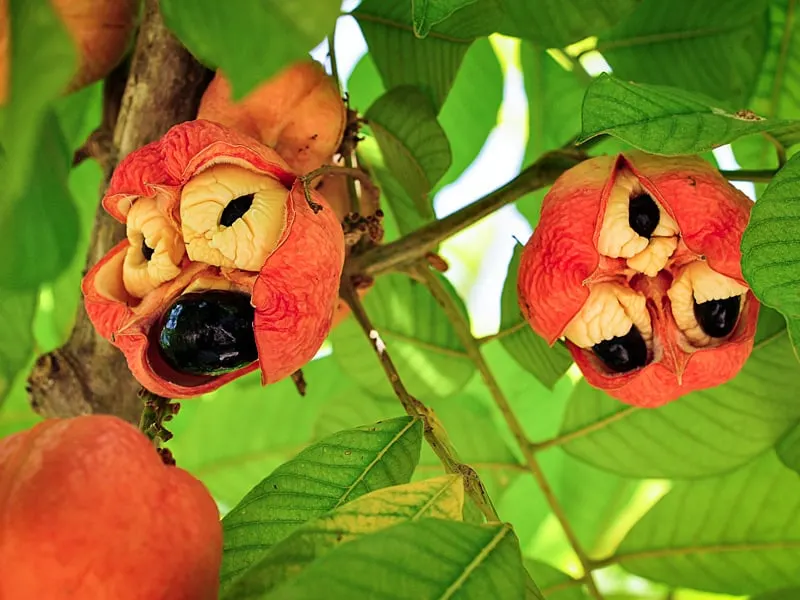
One tiny caveat about ackee, though, is that only the yellow portion of the fruit is edible, while the rest– especially the shiny dark seed–is toxic to humans.
I always do love it when there is a present sense of danger in a dish.
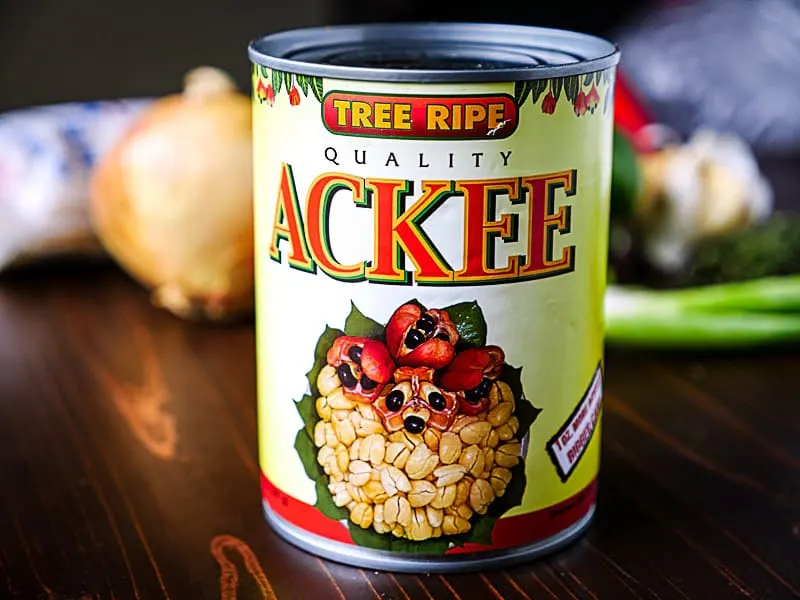
Thanks to that whole toxicity thing, the FDA doesn’t allow the sale of fresh ackee in the States. So, unless you’ve got a Jamaican connection, unfortunately you’ll be getting your ackee from a can. You should be able to find it at any decent international market or you can order it on Amazon.
Along with the ackee, I also get the saltfish for this recipe from an international market.
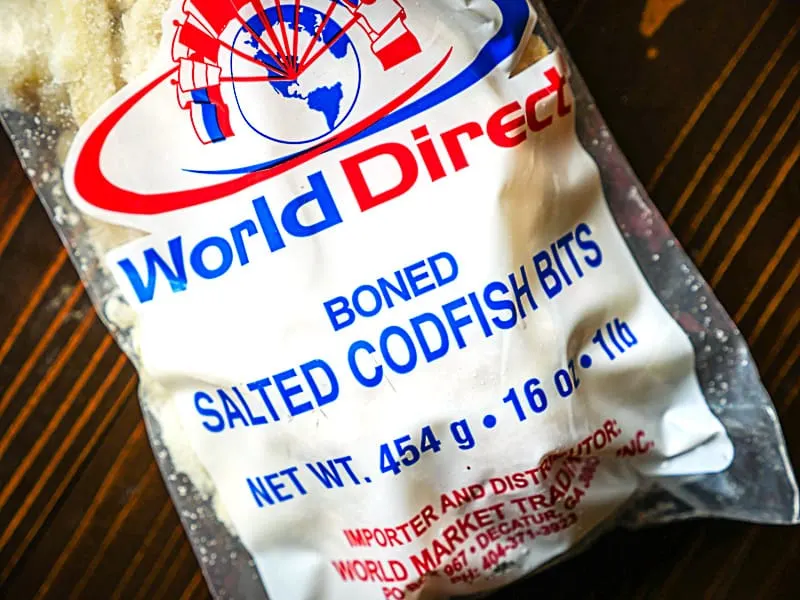
If you have trouble finding it, you can substitute with regular cod filets and add some salt to the skillet later (just be aware that this is borderline sacrilegious in Jamaica).
How to Make Ackee and Saltfish
Start by draining the canned ackee well and give it a good rinse.

Next, rinse the saltfish extremely well, then add it to a pot and cover with cold water. Boil the fish for at least 20 minutes.

Drain and rinse the cod again, then flake it into small bits.

Heat some coconut oil in a large skillet over medium high heat, then add sliced onions, bell peppers, Scotch bonnet pepper, green onion, garlic and fresh thyme.
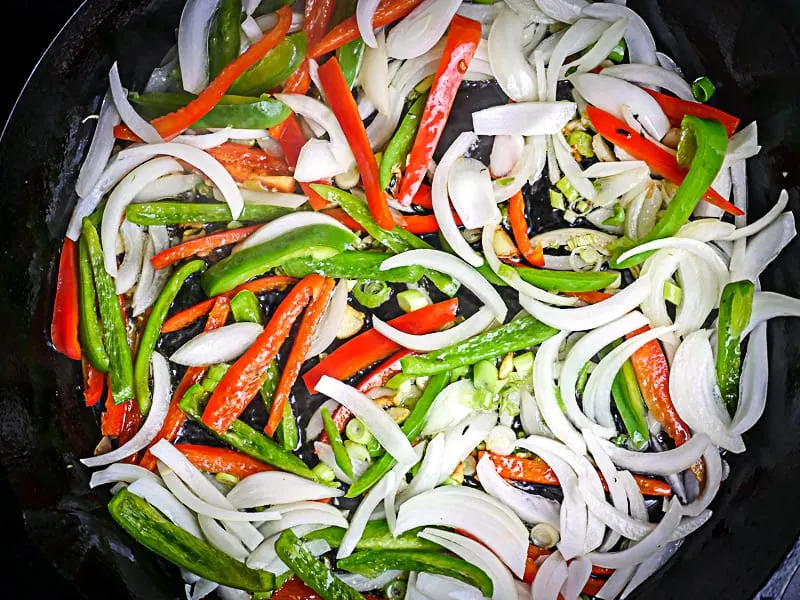
Sauté until the onions and peppers are tender, about 5-6 minutes.

Add the flaked saltfish and a diced tomato to the skillet. Cook for another five minutes, stirring occasionally.

Finally stir in the ackee and some freshly cracked black pepper. Cook until the ackee is just heated through, about 3-4 minutes. Be careful not to overcook the ackee to ensure it doesn’t turn to mush.
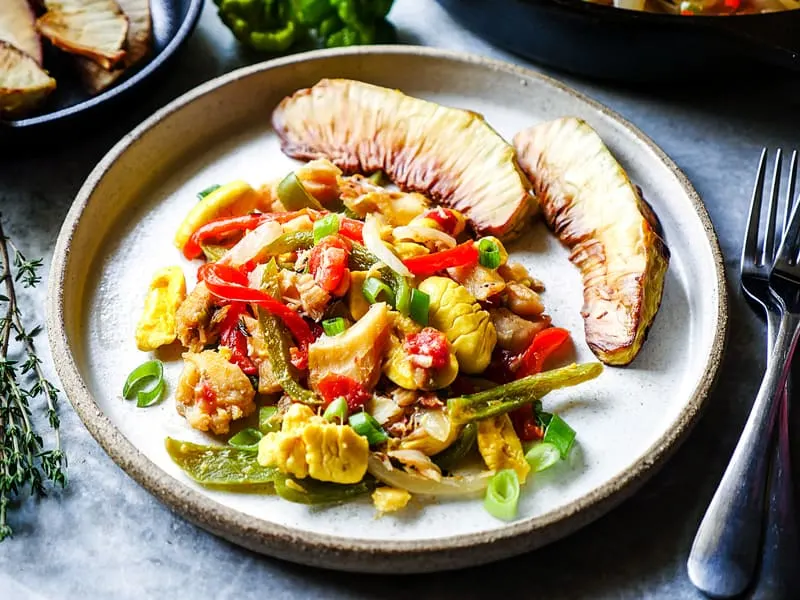
Serve your Ackee and Saltfish with some roasted breadfruit and/or fried plantains. Enjoy at delicious taste of Jamaica!
Ackee and Saltfish
Ingredients
- 1 pound boneless salted cod*
- 2 tablespoons coconut oil
- 1 large onion sliced
- 1 green bell pepper sliced
- 1 red bell pepper sliced
- 1/2 Scotch bonnet or habanero pepper seeded and minced
- 3 cloves garlic minced
- 3 scallions sliced
- 2 teaspoons fresh thyme
- 1 large tomato seeded and chopped
- 1 (20 ounce) can ackee drained and rinsed
- black pepper
Instructions
- Rinse the saltfish well, then add it to a pot and cover with a few inches of cold water. Boil for 20 minutes, then drain and rinse the fish again and flake with a fork.
- Heat the coconut oil in a large skillet over medium high heat. Add the onion, peppers, garlic, scallions, and thyme. Saute until the onions and peppers are tender, about 5 minutes.
- Add the saltfish and tomato to the skillet. Cook for another 5 minutes, stirring occasionally.
- Stir in the ackee along with some black pepper to taste. Cook until the ackee is heat through, about 3-4 minutes.
- Serve with roasted breadfruit and fried plantains. Enjoy!
Notes
The ingredient or equipment sections above may contain affiliate links to products that I personally use or recommend!
This post was originally published on September 16, 2018 and last updated September 1, 2020.

Coach Lorraine
Tuesday 19th of January 2021
No one eats the seed and it's important to mention that the poison is in the red connective tissue that must be removed after harvesting the tree opened ackee pod. Forcing the pod open is poisonous and consuming the connective tissue can cause vomiting
Dr T
Sunday 28th of November 2021
@Coach Lorraine, the toxin called hypoglycin is in the entire fruit including the seed, not just the red connective tissue. Once the ackee naturally opens after ripening it is released in gaseous form. This makes the fruit safe to eat. Consuming the fruit before it ripens can cause death not just vomiting. The connective tissue itself escapes in many a pot and is not known to cause harm